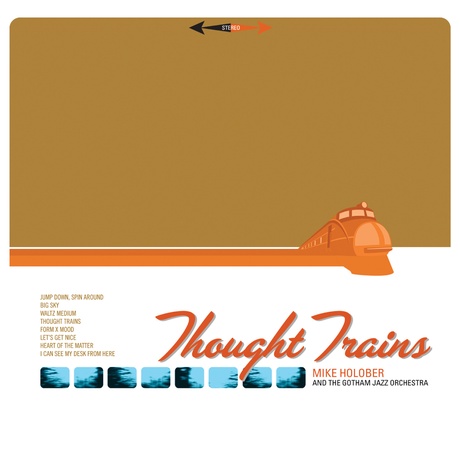
Source
Thought Trains
Mike Holober

Source
"Jazz has little patience," wrote Whitney Balliett in explaining the unstoppable evolution of jazz improvisation through time, from its genesis as "random gestures of black protest" through the melodic interpretations and re-inventions that helped define the idiom beginning in the 1920s, to the creation of "free jazz," in which all the elements of music are mutable.
That's the long view. Up close, you see jazz as a veteran traveler who knowingly practices a lot of patience, who can sit there in a waiting room at a station and listen to the surrounding purls of human activity with utter fascination. To the attuned, there's music in all those moment-long discernments that make the waiting — for others, for your turn, for something to happen — integral and important. The pause is for preparation.
Mike Holober loves trains. In his youth he spent many long summer days in upstate New York waiting by the tracks of Metro North's Harlem Valley line for the big locomotives pulling freight cars and the commuter trains to rumble past: Patience rewarded. A recent camping trip found the pianist-composer situated not far from a railway that crossed through the wilderness, and when the late night freight was coming down the tracks, he said, "I felt that child-like thrill all over again," and added, "It must be nostalgia." Or the muse.
"Steel on steel, thousands of miles of steel or tracks, with thousands of round, steel wheels — what a happy marriage!" Duke Ellington loved trains, too, and understood better than most people how they conjured something primitive in people while simultaneously heralding the modern. Do you think a majority of musicians and composers today miss the "romance of the rails" that once touched millions, that they've become alienated from the "rhythm of the motion"?
Not Holober. Trains – as literal objects needing to be experienced or subjects perfect for metaphor – still matter to him. He titled a commissioned piece written for the American Saxophone Quartet "Views from a Train" (The Commission Project, Sons of Sound SSPCD009) and a new song that he's playing these days in a piano-vocal duo is "When There Were Trains." Obviously, Holober has other conceptual and thematic preoccupations, as those who know his extraordinary 2003 quintet release, Canyon, will attest. It's an album in which Holober, an avid outdoorsman, is able to regard the designs found in natural landscapes and thus translate ideas from this activity into the spatial design we know as musical composition. Now we know that in the quietude of remote America this jazz artist still has his ears perked for the toot of a train whistle.
Thought Trains – a real exercise in patience, as the album was recorded in 1996 but only mixed, finally, last year – finds Holober emerging from the big band traditions of jazz with his own stylistic framework of instrumental voicings and amalgamations. From the gathering of steam underneath John Riley's brushes and the "uh-oh" horns that commence the album, the eight songs on Thought Trains is the kind of kinetic statement you'd expect from someone who still exclaims in wonder to anyone in earshot, "Here comes a train!" The fact that much of Thought Trains was "through composed," said Holober, means, of course, that he penned one musical idea after another, hitching them together like cars for a boisterous engine to pull, the whole, sizable, forward-moving entity a creative dynamo to be enjoyed. Trains of musical thought from bona fide travel agent.
The Gotham Jazz Orchestra has been one of Holober's mainstays for the past nine years. On Thought Trains the mix of veterans and (then) thirty-somethings stoke their solos and light into the charts with undeniable spirit. Good writing certainly brings out the best in players, especially on train songs.
Holober remarked not long ago that he's trying to convince his wife Melissa to accompany him on a train trip across Canada. The idea, quaint as it may seem, is really about jazz in motion and all those perfect fathomable pauses.
— Thomas Staudter, May 2004
Mike Holober is an acclaimed composer and pianist whom critics have compared to Herbie Hancock and Bill Evans. Often a guest conductor and soloist in his own right, Holober's work is in the repertoire of the BBC and Stockholm Jazz Orchestras, among others.
A dynamo of a big band record, Thought Trains is vibrant, fun, upbeat, and swinging. In the Gotham Jazz Orchestra, Holober has assembled the finest first call musicians and leaders in NYC.
1 Jump Down, Spin Around (11:33)
2 Big Sky (10:09)
3 Waltz Medium (07:43)
4 Thought Trains (06:37)
5 Form x Mood (06:34)
6 Let's Get Nice (09:06)
7 Heart Of The Matter (11:36)
8 I Can See My Desk From Here (06:16)
Mike HOLOBER, piano, composer, arranger
THE GOTHAM JAZZ ORCHESTRA:
Dave PIETRO, alto and soprano saxophone, flute, piccolo
Jon GORDON, alto saxophone, flute, clarinet
Tim RIES, tenor and soprano saxophones, clarinet
Charles PILLOW, tenor saxophone, oboe, flute, clarinet
Steve KENYON, baritone saxophone, bass clarinet
Tony KADLECK, trumpet, flugelhorn
Scott WENDHOLT, trumpet, flugelhorn
Craig JOHNSON, trumpet, flugelhorn
Joe MAGNARELLI, trumpet, flugelhorn
Bruce EIDEM, trombone
Pat HALLARAN, trombone
Pete McGUINESS, trombone
Nathan DURHAM, bass trombone
Leise ANSCHUETZ, French horn (trks 4 & 5)
Dave GILMORE, guitar (trks 2, 5, & 8)
Ron CARTER, bass
John RILEY, drums